A Crew Leader’s Story of Woodinville’s New Trail Next Door
Volunteer Micki Kedzierski shares her account of a new trail that creates easy access to nature for locals in unincorporated King County. The Greenbrier Trail (and the story of its development) are full of surprises.
by Michaelene “Micki” Kedzierski
I have volunteered with WTA since 2007, with most of my trail work done in the mountains. In recent years, I’ve become curious about WTA’s Trail Next Door campaign with its focus of ensuring everyone in our state has easy access to nature close to home. I’ve worked on several urban trails in the last few years. As a resident of unincorporated King County near Woodinville, I was happy to hear of a trail work opportunity in my community.
There are always surprises in trail work, especially in urban greenspaces — hidden natural beauty, learning about historic land use, unexpected obstacles and community reactions. Working on the Greenbrier Trail presented me with opportunities to learn more about the Woodinville area and to further understand and support the idea of “trails next door.”

Micki (blue hat, third from left) poses with a volunteer trail crew she led on the Greenbrier Trail. Photo provided by Micki Kedzierski.
A Nearby Trail for Greenbrier Heights
The Greenbrier Heights neighborhood is just north of downtown Woodinville and has easy access to public transit. The mixed-income neighborhood was established in 2003 and has a combination of apartment buildings, rental townhouses, single-family homes and a senior housing complex. In 2006, the neighborhood won a commendation from then-governor Christine Gregoire as a “model affordable livable community.”
Construction of a trail connecting Greenbrier Heights to Woodinville-Duvall Road was a condition of the original plan for the neighborhood’s development. After years of use and little maintenance, the trail system in the Greenbrier neighborhood needed work to be safer and more accessible. After holding a public meeting in November 2021 to discuss ideas for the Greenbrier Trail, the City of Woodinville partnered with WTA to revitalize it. The city appreciated WTA’s reputation for rallying a large volunteer force to build and maintain trails across the state, and they encouraged community members to sign up for WTA work parties.
highlights of WTA’s work on the Greenbrier Trail:
- WTA hosted 29 work parties, including two for youth and families, from December 2021 through March 2023
- 305 volunteers, including 41 youth, contributed over 2,130 hours of work
- Crews completed 360 feet of raised, mulched turnpike, and 60 feet of wood puncheon, including a 14-foot and a 16-foot raised puncheon and a 30-foot puncheon bridge
- The existing trail was re-routed to avoid sensitive wetlands and protect the native plant life. Our crew decommissioned the former trail.

Two of our 29 work parties at Greenbrier Trail were for youth and families. Photo by Micki Kedzierski.
Evolution of an Urban Trail
The work was accomplished in two phases. Phase 1 began in December 2021 on the lowland area of the trail, which was badly eroded, uneven and muddy. WTA crews built turnpikes to elevate the trail in these fragile, wet and boggy areas. Crews built a 14-foot short-span foot-bridge, known as “puncheon,” over a boggy area with standing water as well as a 30-foot elevated puncheon bridge over a large area of water and mud — creating access from a parking lot and nearby housing.
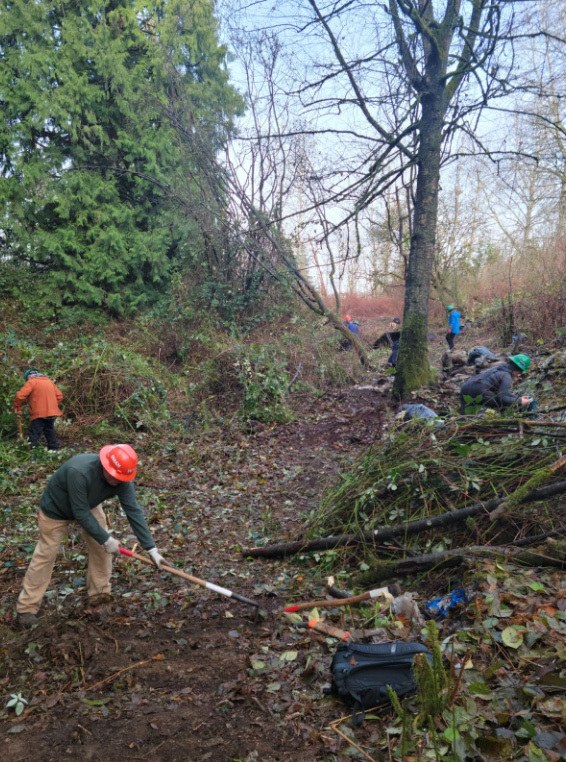
Crews cleared brush and debris to make way for an accessible trail. Photo by Brandon Tigner.
Phase 2 of the work began in December 2022, and continued through lowland areas to the upland forest trail on the east. The work included another turnpike and a 16-foot puncheon bridge. Crews rerouted a section of the former trail away from wetlands. The old trail was decommissioned and restored by transplanting sword ferns and adding woody debris.

Volunteer crews on the Greenbrier Trail persisted through snow, rain and sun! Photo by Brandon Tigner.
Surprises on the Trail
Hikers will encounter surprises in every season on the Greenbrier Trail. The area is a Native Growth Protection Area containing palustrine and upland forest areas. In winter, the forest is dark and wet. In spring, it’s full of Pacific dogwood, osoberry and skunk cabbage in bloom. In autumn, big leaf maples, vine maples, alder and cottonwood add color. A variety of birds occupy the green space, including woodpeckers, flickers, chickadees, Stellar jays, hawks and owls. The upland trail is sheltered, quiet and mystical all year-long. Along the trail sits a massive western red cedar, large enough that six people touching hand-to-hand could measure around the trunk.
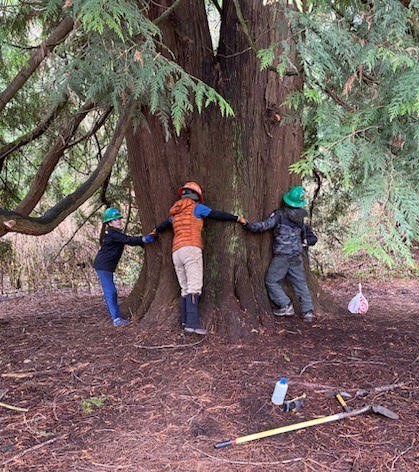
Along the trail sits a massive western red cedar, large enough that six people touching hand-to-hand could measure around the trunk. Photo by Micki Kedzierski.
Over the course of the trail work, we also encountered multiple surprises. Part of the lowland trail and access to the upland forest wends through an area which was, at one time, used by local businesses. As a result, WTA crews encountered a number of artifacts during the re-route construction. What appears to be a large, immovable, fire-tube boiler, along with numerous pipes and fittings located nearby, indicated that the area housed a sawmill or other logging-related enterprise at one time. The boiler was incorporated into the re-routed trail as an historic feature.
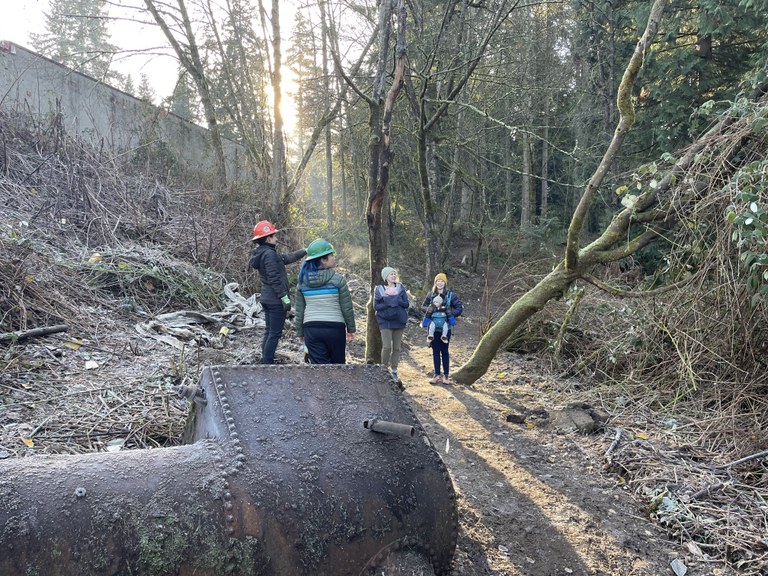
The trail crew incorporated the artifact as a feature along the trail. Photo by Brandon Tigner.
Additionally, we found plastic pots, landscaping materials, and a pick-up truck bed, which indicate that the area was once used as a dump site for local businesses. Work party crews removed much of the debris. Throughout work parties in these areas, crew members and I wondered about the businesses that used this site, whether for actual work or as a dump site — where did so much garden-related garbage come from? How long ago was it dumped? Urban green spaces are often used as dump areas by local communities.
We came on site one day to see that someone had removed all of the logs, branches and ferns we had carefully placed to decommission areas of the old trail. This is another “surprise” that can be encountered in working on an urban trail — local users will often define their own walking/hiking spaces and may be reluctant to relinquish these when more formal, better-designed and safer trails are established.
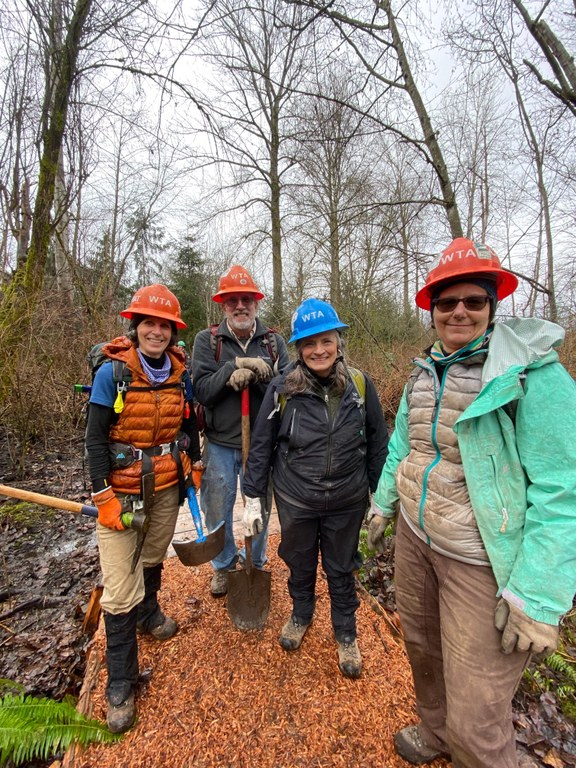
Crew leader Micki with Assistant Crew Leaders on the Greenbrier Trail. Photo courtesy Micki Kedzierski.
Celebrating Woodinville’s new Trail Next Door
The completion of Phase 2 was marked on March 31, 2023, with a work party and ribbon cutting ceremony, attended by WTA volunteers, representatives of the City of Woodinville and several Greenbrier Heights residents. City representatives thanked volunteers and praised WTA’s “vast knowledge, committed volunteer work, and unparalleled passion for trails.”
I was asked to hold one end of the ribbon while a Woodinville resident youth, who worked on this trail a number of times, held the other end. It was an added pleasure for me as I have worked periodically with this volunteer since his first WTA work-party as a seventh grader; he is now a high school senior and will graduate in a few months.

The Greenbrier Trail ribbon cutting brought together WTA staff and volunteers, representatives from the City of Woodinville and community members. Photo by Kindra Ramos.
Working on this trail was a true community effort — many neighborhood residents came out on more than one work party; as time went on, local residents would often walk through as we were working; they shared stories about the area, asked questions, made suggestions, commented on progress and expressed gratitude. The newly refurbished trails provide safe and usable access to the community to this lovely urban greenspace.
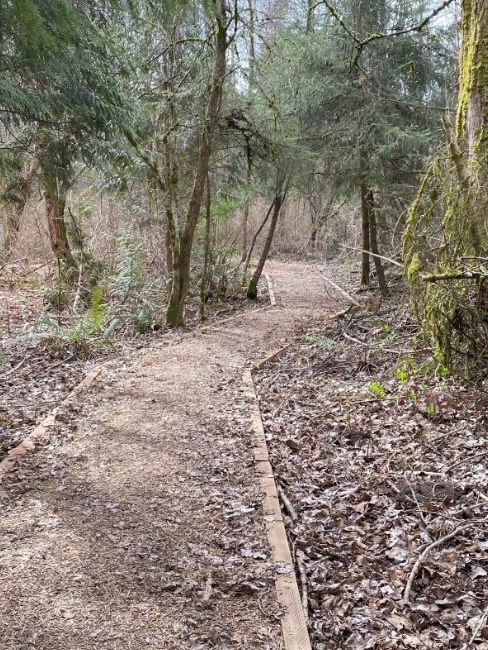
A completed stretch of the Greenbrier Trail. Photo by Micki Kedzierski.
When you join WTA, you’re supporting our volunteer-powered work to ensure everyone in Washington has access to nature. Become a member today.



Comments